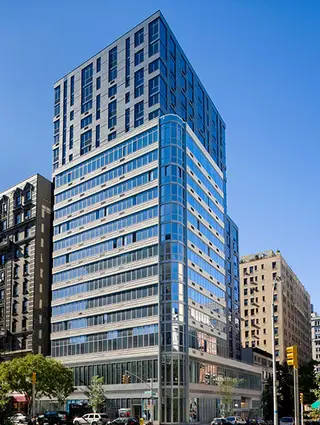 Carter Horsley
Carter HorsleyDec 23, 2011
Carter's Review
The Melar at 250 West 93rd Street on the southwest corner at Broadway is a 20-story, 143-unit rental apartment building developed by Friedland Properties.
Designed by Costas Konylis & Partners, it is has a light-colored base with a setback dark-colored tower.
The building, which is also known as 2491-5 Broadway, has rounded corner windows in its base at its Broadway corner.
This area of Broadway has changed dramatically in recent years with several handsome new apartment buildings a couple of blocks of north and two taller apartment towers a few more blocks to the north. In addition, a major renovation of the 96th Street subway station was completed in 2010.
The pet-friendly building has 24-hour doorman and concierge service, a landscaped sun deck, a fitness center, bicyle storage and private resident storage lockers.
Apartments have floor-to-ceiling windows. Kitchens have in-sink disposals and stone counters and bathrooms have fog-resistant mirrors and lacquer-style vanities.
The area abounds in restaurants and Riverside Park is a short walk away.
The U. S. Attorney for the Southern District of New York announced July 25, 2011 that the developer and architect of The Melar had violated federal law because it was not compliance with the Fair Housing Act that since 1991 required new multi-family housing complexes with at least four units to be built with certain features that make them more accessible, according to a July 26, 2011 article by Amanda Fung at crainsnewyork.com
"The settlement ends three years of negotiations between the government and the project's developer, Friedland Properties, or L&M 93rd Street, and the project's well-known architect, Costas Kondylis & Partners," the article said.
"The developer of the 143-unit property...has agreed to establish a $180,000 fund to compensate individuals harmed by the lack of accessible features in the building and to pay $40,000 in a civil penalty to the U.S. Separately, Costas Kondylis agreed to pay a civil penalty of the same amount. In addition, both firms agreed to require their employees to undergo training on the requirements of the Fair Housing Act, which prohibits discrimination in housing," the article said.
"The Fair Housing Act is an important safeguard for those with disabilities and helps ensure that they can enjoy full use of and access to their living spaces," said Manhattan U.S. Attorney Preet Bharara, in a statement. "Architects, owners and developers play a key role in making sure that these requirements are met, and when they fail to do so, this office will hold them accountable."
The article noted that "Friedland was one of 11 developers who received notices a few years ago that their properties violated the Fair Housing Act, according to Steven Spinola, president of the Real Estate Board of New York, which has worked with the developers on the cases."
"Mr. Spinola," the article continued, "said all these properties were built in compliance of city accessibility law for the disabled, which was enacted long before 1991, and that developers believed that since their projects were in line with local code, they should also be in accordance with the federal law. 'We wanted the federal government to say that the city code meets the law,' said Mr. Spinola, adding that more than 100,000 residential properties across the city could be at risk of violating the Fair Housing Act. He noted that negotiations with the other 10 developers will likely begin, but in those cases the properties are much bigger than The Melar. 'We don't know how larger buildings will be treated,' he added."
The 22-story Melar was built in 2007, the article said, adding that "the federal government filed a complaint against the developer and architect in October 2010, after conducting an investigation of The Melar and inspecting the building's public and common areas as well as its apartments."
"During that investigation," the article continued, "the government found that some features in the building, such as the height of mailboxes, were inhibiting to individuals in wheelchairs. It also found that floor spaces in bathrooms were not big enough for maneuvering and kitchen entrances were too narrow, therefore violating the Fair Housing Act."

- Rental built in 2007
- 5 apartments currently for rent ($5.9K to $7K)
- Located in Riverside Dr./West End Ave.
- 143 total apartments 143 total apartments
- Doorman
- Small Pets Allowed only
 6sqft delivers the latest on real estate, architecture, and design, straight from New York City.
6sqft delivers the latest on real estate, architecture, and design, straight from New York City.
